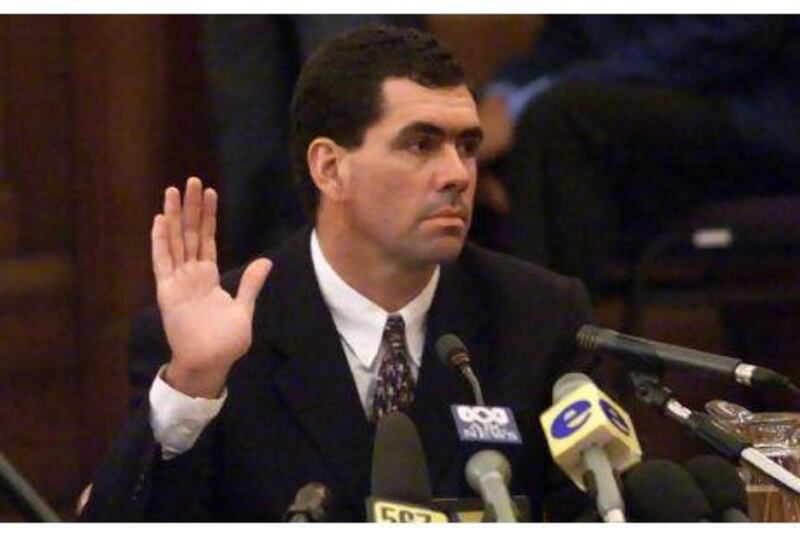A three-man tribunal consisting of Justice Albie Sachs, Michael Bellof QC and Sharad Rao will tomorrow deliver a verdict on the spot-fixing case that rocked cricket last year.
Once the verdict is announced, the panel will deliberate over what sanctions, if any, are to be handed down. The chances are that there will be exemplary punishment.
Cricket fans across the globe should be thankful that such esteemed "neutrals" oversaw the hearing. For an organisation that gets a lot of criticism, the International Cricket Council (ICC) has done right by the game in this case. Haroon Lorgat, the chief executive, deserves credit for not shying away from the problem as some of his predecessors once did.
They may have been great players in their day, but some of the game's administrators showed the backbone of jellyfish when addressing match-fixing.
Just consider Ali Bacher's testimony to the King Commission in 2000.
According to him, not one of the ICC's member countries had protested when Sir Clyde Walcott, the then president, and David Richards, the chief executive, decided to keep the Shane Warne-Mark Waugh affair [involving "John the Bookie"] a secret.
Bacher himself admitted that he had been made aware of match-fixing as far back as 1995.
"There's a viewpoint in the ICC that it should have been brought to the attention of all the administrators at that time," he said, which must rank as one of the most pathetic excuses for inaction.
A year before the King Commission probed the Hansie Cronje match-fixing scandal and its aftermath, Majid Khan, then involved in Pakistan's cricket administration, had told Bacher of two World Cup matches (in 1999) being fixed. Again, Bacher opted for a head-in-sand approach, speaking up only after the Delhi Police had caught South Africa's blue-eyed boy on tape.
In 2000, Pakistan also had an inquiry. Justice Malik Mohammad Qayyum recommended many things, most of which were never implemented. The two players banned for life, Salim Malik and Ata-ur-Rahman, were surplus to requirements in any case.
Six years later, in an interview with Cricinfo, Qayyum said: "For Wasim [Akram] I had some soft corner for him. He was a very great player, a very great bowler and I was his fan, and therefore that thing did weigh with me. Two things - one, I didn't want that cricket should be deprived of his participation, and the other was that I didn't want that towards the end of his career ... he should be banned or something like that."
Can you think of a more compelling reason not to have home boards investigate such matters?
In Pakistan's case, the nudge-nudge-wink-wink response to Qayyum's recommendations is directly responsible for the cricket team's current plight. As long as charlatans are allowed to stay in the system, many more promising talents like Mohammad Aamer will be ruined.
A compromised player is a cancerous tumour. Unless you excise him from the game, he will eventually infect all those around him.
When they testified before Qayyum, Basit Ali and Rashid Latif spoke of going into Malik's hotel room during a 1995 tour and meeting Muhammad Hanif Kodvavi, also known as Hanif Cadbury, Pakistan's best-known bookmaker.
Later that decade, Kodvavi fell out with Dawood Ibrahim, the underworld don who fled Mumbai in the late 1980s. The dispute was primarily about millions of dirhams allegedly staked on games in Sharjah. By the end of the decade, Kodvavi was dead, shot 67 times and then mutilated.
Malik played for Pakistan until 1999. Are we to believe that no one in the Pakistan Cricket Board was aware of the dubious company that he kept?
Many are already speculating that Salman Butt and Mohammad Asif will be banned for life, with Aamer likely to get five years on account of him being younger and impressionable.
If that turns out to be true, the ICC would have taken a huge step towards ridding the game of corruption. I do not know Butt well enough, but I believe Asif deserves the harshest possible punishment. He has already been caught for using both performance-enhancing and recreational drugs.
The subsequent indifferent attitude speaks of a man who does not value the privilege of playing for his country. One mistake? It can happen. Two? You are trying our patience. Three strikes? You're out, and you deserve to be.
We can only hope that the tribunal also passes on some good advice to Aamer, because he clearly does not seem to be getting any at home.
Playing in an unauthorised match in violation of ICC sanctions, as he did last week, really is not the best way to show contrition and plead for a second chance.
If two potentially great careers – Butt was unlikely to be one for the pantheon – are ended or stalled, it will be a sad day for cricket.
But after the impotence of the past decade and more, it is time the game stood up for itself.





